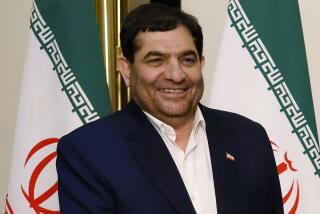Powell, Sharon Confirm ‘Rock-Solid’ Relations
Two old soldiers, Ariel Sharon and Colin L. Powell, joined Monday in proclaiming an unshakable alliance between Israel and the United States, papering over differences in approach to the stalled Middle East peace process.
For Sharon, meetings with Secretary of State Powell and other administration officials kicked off his first visit to Washington as Israel’s prime minister, a trip he hopes will convince Americans that his record of hard-line nationalism is not incompatible with Mideast peace. He meets President Bush today at the White House.
Powell and Sharon, both former generals who have known each other for decades, addressed the American Israel Public Affairs Committee, a powerful pro-Israel lobby, in separate speeches. Both were applauded vigorously.
The U.S. relationship with Israel “is and will remain rock-solid,” said Powell, 63.
“I have come to Washington to deepen and strengthen the special relationship between our peoples,” said the 73-year-old Sharon.
They joined in condemning Palestinian violence as an obstacle to renewed peace talks.
“Violence is corrosive of everything the parties in the region hope to achieve,” Powell said. “Violence provokes armed reaction, not compromise.”
Sharon, who has made an end to Palestinian violence a precondition for resuming peace talks, said Palestinian leaders “are returning to the belief that they can defeat Israel by armed struggle. They feel that violence will produce further Israeli concessions.” But Israel will never yield to violence, he said.
Israel Isn’t Blameless, Powell Indicates
Although Powell insisted that the new U.S. administration “will not strive for some arbitrary measure of evenhandedness when responsibility is not evenly shared,” he made it clear that Washington doesn’t consider Israel to be blameless. Powell said Israel’s economic squeeze on Palestinian-governed sections of the West Bank and Gaza Strip contributes to a building Middle East catastrophe.
He reiterated that the United States “continues to support a comprehensive peace in the Middle East, one based on U.N. Security Council Resolutions 242 and 338, and the formula of land for peace.” Sharon is profoundly skeptical of the U.N. resolutions, which call on Israel to withdraw from occupied territories.
Still, Sharon said he is ready to make peace.
“Every Israeli prime minister sought to advance the peace process in his own way,” he said. “All of Israel seeks peace. . . . I believe Israel can reach agreement with the Palestinians, and I will make every effort to reach such an agreement.”
Powell’s speech was warmly received by his pro-Israel audience. He was applauded repeatedly, although his listeners reacted with stony silence when the secretary referred to the 1993 signing of Israeli-Palestinian peace accords on the White House lawn. The so-called Oslo accords formed the basis of former Israeli Prime Minister Ehud Barak’s peace effort, but Sharon has pronounced the Oslo process dead.
“I will never forget the famous handshake [between Palestinian Authority President Yasser Arafat and the late Israeli Prime Minister Yitzhak Rabin] in that moment of high hope,” Powell said in what would have been a sure applause line in the past. The reaction appeared to indicate that U.S. supporters of Israel share Sharon’s view that the accord is no longer relevant.
“It was a little better than I expected,” said Abe Foxman, director of the Anti-Defamation League. “When the time will come, this administration will do what is necessary.”
However, Foxman said he was disappointed that Powell didn’t say the word “Jerusalem.”
Powell committed something of a diplomatic faux pas earlier this month when he referred to Jerusalem as “the capital of Israel” while responding to a question from a congressional committee.
The United States, like most of the rest of the world, maintains that the status of Jerusalem, which was divided before the 1967 Middle East War, must be decided by negotiations. Powell apologized to several Arab governments for his remarks.
The Issue of Jerusalem Takes Center Stage
Tim Wuliger, president of the American Israel Public Affairs Committee, drew a standing ovation when he said in his introduction of Powell: “This is one community that appreciates your testimony before the House International Relations Committee that Jerusalem is Israel’s capital.”
According to one insider, Wuliger originally intended to refer to Powell as the first secretary of State to recognize Israel’s claim to Jerusalem.
But the State Department vetoed that version. Introductions of a secretary of State are routinely submitted to the department for clearance.
Sharon left no room for ambiguity in his speech: “I bring you greetings from Jerusalem, the eternal capital of the Jewish people for the past 3,000 years and of the state of Israel for the past 52 years and forever.”
Several hundred members of the Council on American-Islamic Relations and other Muslim groups shouted slogans across the street from the Washington hotel where Sharon appeared Monday evening, while a slightly smaller number of supporters of Israel gathered directly in front of the hotel. There were no reports of violence.
The annual policy conference of the American Israel Public Affairs Committee often features a speech by the U.S. president. Bush, who addressed the group last year as Texas governor, left it to Powell to deliver the administration’s message this year.
More to Read
Start your day right
Sign up for Essential California for news, features and recommendations from the L.A. Times and beyond in your inbox six days a week.
You may occasionally receive promotional content from the Los Angeles Times.






